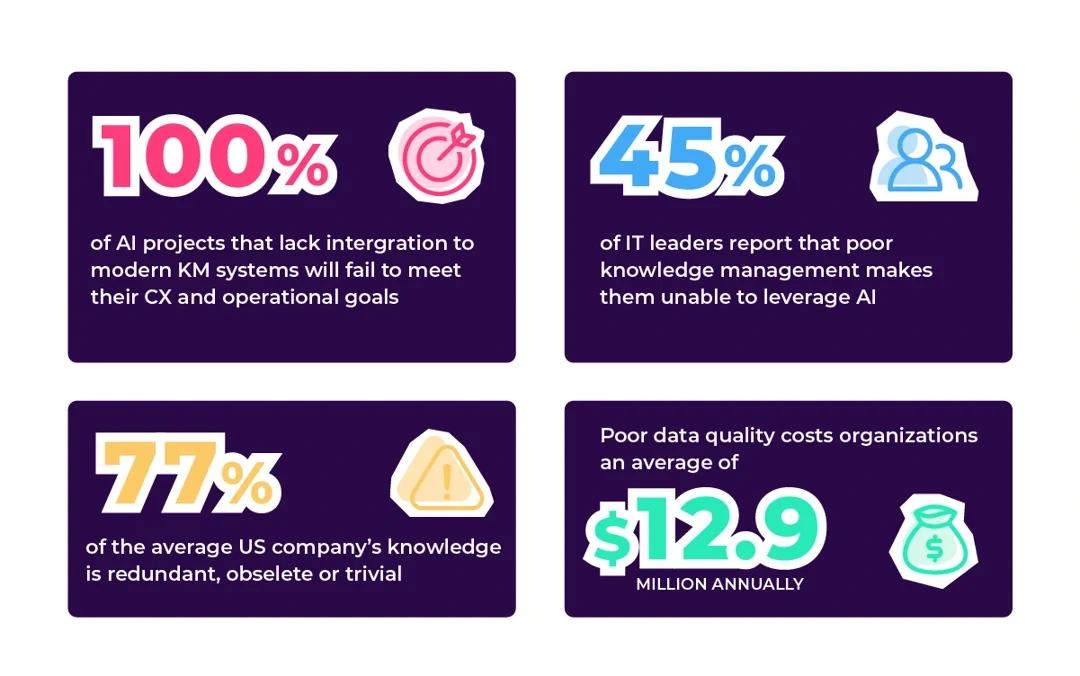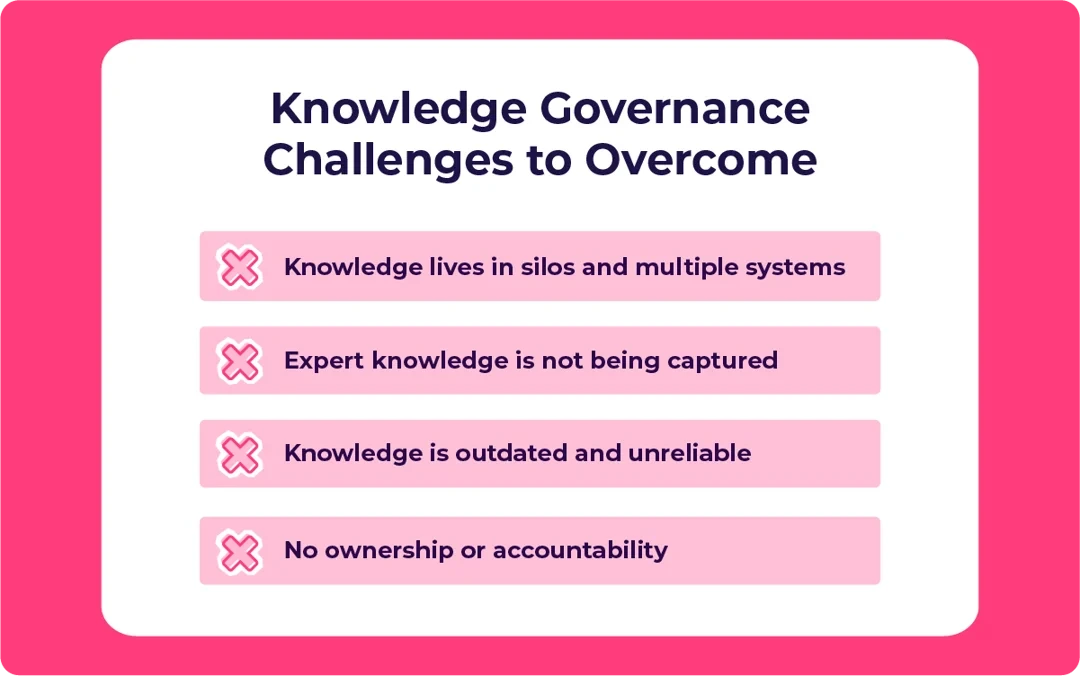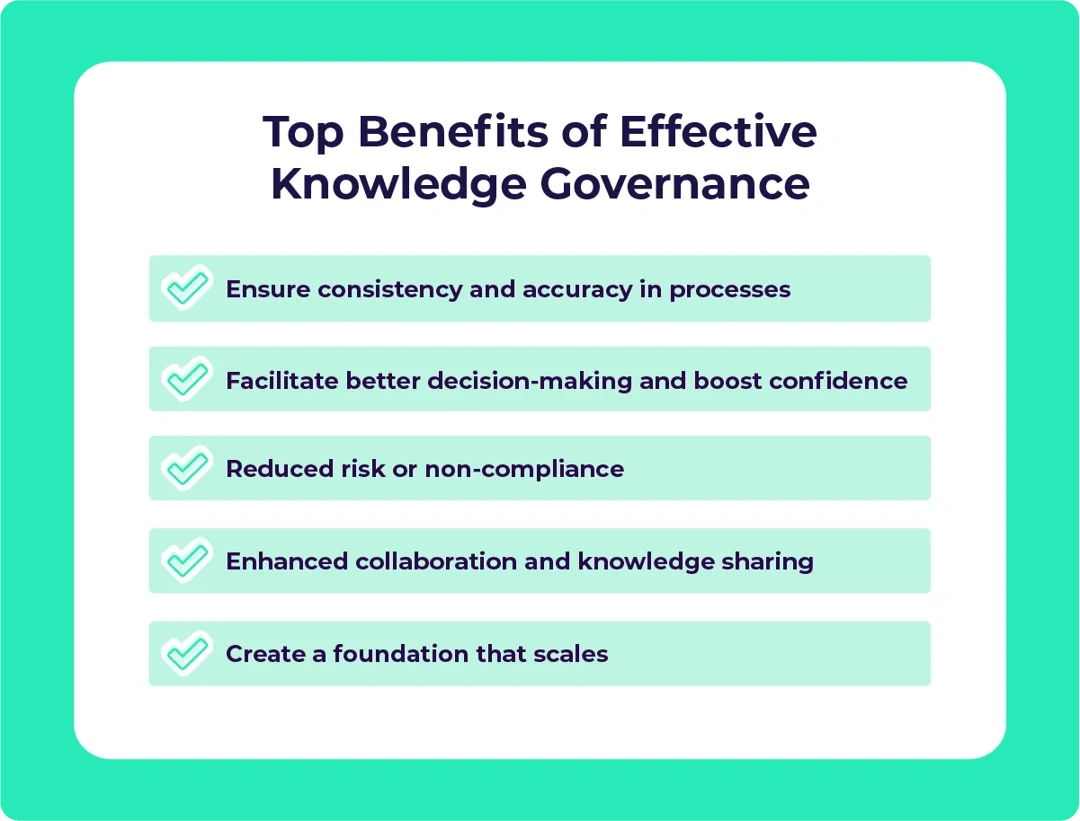The effectiveness of automation and AI heavily depends on the quality of the knowledge they are built upon. In fact, 100% of generative AI projects that lack integration to modern knowledge management systems will fail to meet their customer experience and operational cost-reduction goals.
Knowledge governance—the framework for managing an organization's knowledge assets—is central to ensuring AI implementations are successful. This guide explores how knowledge governance supports AI success, why it matters, key components, benefits, and practical strategies for ensuring AI systems are only as good as the knowledge they leverage.
What is knowledge governance?
Knowledge governance refers to the systematic management of an organization's knowledge assets, including the policies, processes, roles, and technologies that ensure knowledge is captured, shared, maintained, and used effectively.
When AI is involved, governance becomes non-negotiable. Effective knowledge governance ensures that the knowledge feeding AI systems is:
- Accurate and consistent
- Aligned with organizational goals
- Compliant with regulatory standards
- Protected through access controls, privacy, and security
Without robust knowledge governance, organizations risk basing AI decisions on poor-quality or outdated knowledge—leading to flawed insights, increased operational risk, and compliance issues.
Why do you need knowledge governance before implementing AI?
If AI is the engine, knowledge is the fuel. Garbage in, garbage out isn’t a saying—it’s an inevitability.
Strong knowledge governance ensures that AI systems operate with high-quality inputs, align with business objectives, and comply with regulations. Without it, AI can produce unreliable results, creating risk and missed opportunities.

Alignment with business objectives
Knowledge governance ensures the knowledge used by AI systems aligns with the organization’s strategic goals. This maximizes the value of AI, ensuring AI-driven decisions support real business outcomes.
Data quality and integrity
AI systems require high-quality, well-governed data to function correctly. With 77% of the average US company’s data being redundant, obsolete, trivial, or “dark data,” governance is how you prevent AI from learning from noise.
Knowledge governance helps ensure the knowledge base remains accurate, consistent, and free from issues that compromise AI outcomes—improving the reliability of AI insights.
Regulatory compliance
Many industries have strict regulations regarding data handling. Knowledge governance helps organizations ensure their AI systems comply with these standards, avoiding penalties and supporting ethical AI use.
Risk management
Proper knowledge governance minimizes risk from data breaches, biased outputs, and misuse of information. It ensures AI systems are secure and reliable, reducing vulnerabilities and threats.
Improved AI decision-making
Structured governance ensures AI systems have access to accurate and relevant information—leading to better decisions, stronger predictions, and higher confidence in AI-driven processes.
Knowledge governance challenges to overcome
The principle of garbage in, garbage out is critical: poor-quality inputs lead to unreliable outputs. If an organization lacks proper controls over how knowledge is created, categorized, and maintained, the resulting decisions and processes will be flawed.
Without solid knowledge governance, AI and automation will increase inconsistencies, inefficiencies, knowledge gaps, and compliance risks. Strong governance ensures only accurate, relevant, well-structured knowledge enters the system—supporting reliable decision-making and operational excellence.

Knowledge lives in silos and multiple systems
In many organizations, knowledge is spread across systems and departments, creating silos that block access to complete and consistent information. This fragmentation is a major issue for AI systems, which require a unified and reliable knowledge foundation.
Expert knowledge is not being captured
A critical issue is failing to capture expert knowledge. Valuable insights often remain in people’s heads—creating knowledge gaps when employees leave or change roles. This lack of documented knowledge weakens AI performance, which depends on comprehensive, detailed inputs.
Knowledge is outdated and unreliable
AI depends on current, accurate knowledge. But many organizations struggle with outdated information. One study found that 45% of IT leaders reported poor data management prevents them from leveraging emerging tech like generative AI.
Regularly updating and verifying knowledge reduces the risk of flawed AI insights.
No ownership or accountability
Without clear ownership, knowledge becomes neglected—leading to inconsistency and gaps. Governance assigns accountability so knowledge stays accurate, maintained, and accessible, supporting reliable AI outcomes.
Components of knowledge governance for effective knowledge management
Knowledge governance is made up of key components that work together to ensure knowledge assets remain reliable and usable—especially for AI. These components align closely with broader knowledge management components.
Core governance components include:
Knowledge policies and standards
These define the rules for managing knowledge that feeds AI systems, including:
- Data quality expectations
- Access control
- Privacy and security requirements
The goal is to keep the knowledge base robust and secure.
Roles and responsibilities
Clear roles ensure governance practices actually happen. Common roles include:
- Data stewards
- Knowledge managers
- AI ethics officers
Each supports adherence to governance standards.
Knowledge management processes
These are the workflows for capturing, storing, sharing, and using knowledge for AI. Governance processes should be well-defined and integrated into the organization’s knowledge management process and knowledge workflow.
Technology and tools
The right tech stack supports governance and makes it scalable. This can include:
- Knowledge management systems
- AI training platforms
- Analytics tools
These tools help keep knowledge governed, accessible, and AI-ready.
Metrics and measurement
You can’t govern what you don’t measure. Establishing metrics helps teams monitor and improve governance over time.
Common governance metrics include:
- Data quality scores
- AI accuracy rates
- Compliance rates
(See: knowledge management metrics)
Top benefits of knowledge governance for business
There are many benefits of knowledge governance, from improved AI accuracy to better compliance and risk management—leading to more reliable and effective AI implementations.

Ensures consistency and accuracy in processes
Knowledge governance ensures AI systems operate on consistent and accurate knowledge. Standardized processes reduce errors and improve reliability in AI-driven workflows.
Facilitates better decision-making and boosts confidence
With well-governed knowledge, AI systems provide more accurate insights—supporting better decisions and building trust in AI outputs.
Reduces risk of non-compliance
Poor data quality costs organizations an average of $12.9 million annually. Knowledge governance helps organizations comply with industry standards by managing privacy and security effectively—reducing risk, penalties, and ethical breaches.
Enhances collaboration and knowledge sharing
Governance helps break down silos and encourages knowledge sharing across departments. This gives AI systems access to a broader, more complete knowledge base and strengthens organizational learning.
Creates a foundation that scales
A well-structured governance framework creates a scalable foundation for AI. As organizations grow, governance ensures AI systems remain efficient and aligned with long-term business goals.
Strategies for implementing knowledge governance
Implementing knowledge governance requires a strategic approach. Organizations need clear objectives, an actionable framework, stakeholder involvement, the right technology, and ongoing oversight.
Define clear objectives
Start by defining what you want to achieve with knowledge governance in the context of AI. Objectives should align with business goals and address the specific challenges your organization faces.
Develop a governance framework
Create a framework that includes policies, processes, roles, and metrics specifically for AI systems. The framework should be tailored to your organization’s needs and AI strategy.
Engage stakeholders
Involve stakeholders across departments to ensure buy-in and support. Stakeholder engagement is crucial for successful AI implementations and sustained governance adoption.
Leverage technology
Implement the right technology to support governance, including data management systems, AI development tools, and analytics platforms that help maintain data quality and governance.
Provide training and support
Train employees on governance policies and processes so the framework is applied consistently. Ongoing support helps teams maintain governance standards over time.
Monitor and review
Continuously monitor governance effectiveness and adjust as needed. Regular reviews help identify improvements and keep the framework relevant as AI and organizational needs evolve.
Future trends in knowledge governance and AI
Knowledge governance will continue evolving as AI capabilities expand and organizations scale their use of automation.
Integration with AI and machine learning
AI and machine learning will increasingly automate governance activities, improve knowledge discovery, and support better AI decision-making.
Focus on data privacy and security
With rising privacy and security concerns, governance frameworks will need stronger controls to protect sensitive information feeding AI systems.
Enhanced collaboration tools
Remote and global teams increase demand for collaboration tools that support knowledge sharing and governance across locations, ensuring AI has broad access to reliable knowledge.
Continuous improvement and innovation
Organizations will need a continuous improvement mindset—regularly updating governance frameworks to match changing business needs and new AI capabilities.
Getting started with knowledge governance in your organization
Knowledge governance is a critical foundation for successful AI. By implementing a robust governance framework, organizations can improve AI accuracy, ensure compliance, reduce risk, and create a scalable knowledge foundation that supports long-term performance.
To learn more about ensuring your organization’s knowledge is ready for AI, visit our solutions page and explore how to build a foundation of trusted knowledge that sets your team—and your AI—up for success.



